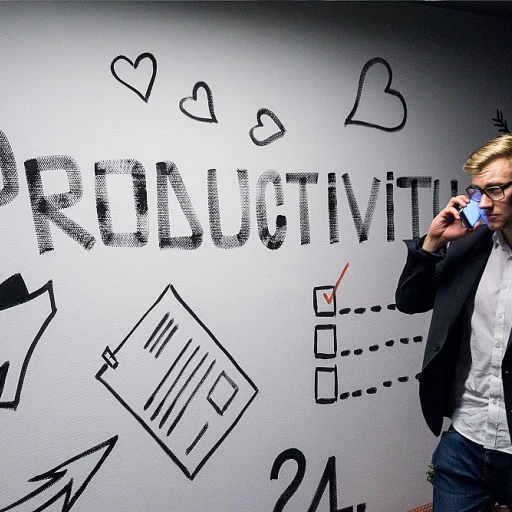
Understanding AI's Role in HR Decision-Making
The Integration of AI in Human Resources
Artificial intelligence is revolutionizing human resources by transforming how companies make decisions. By integrating AI into HR processes, companies can leverage data-driven insights to enhance decision-making, improve resource services, and streamline various aspects of HR operations. This shift towards AI-powered systems in HR can significantly enhance efficiency and effectiveness in meeting the diverse needs of employees and management teams. AI's role in HR is multi-faceted, influencing everything from recruitment to employee engagement and performance management. The utilization of AI in decision-making allows HR professionals to make more informed and strategic choices, benefiting both the company and its employees. Companies across the United States and beyond are discovering the benefits of AI in improving HR processes. From risk management to workers compensation, AI technologies are being used to enhance long-term outcomes and boost employee benefits programs. Additionally, AI tools are proving invaluable in the recruitment process, improving talent acquisition, and ensuring that the best candidates are selected efficiently. AI's contribution doesn't stop at hiring; it extends to enhancing company culture and professional development. By harnessing AI, HR departments can support team members more effectively, leading to improved employee satisfaction and engagement. With these advancements, AI helps companies maintain competitive advantage and foster a supportive work environment. Exploring the potential of platforms like Hiretual in AI-driven HR showcases how AI applications are transforming human resource management. From mobile phone alerts to automated email responses, these technologies streamline communications and boost efficiency. In conclusion, integrating AI into HR decision-making empowers businesses to maximize their resources, improve efficiency, and support employees more effectively. Embracing these technologies enhances human intervention in HR processes, leading to significant benefits for everyone involved.AI-Powered Recruitment: Streamlining the Hiring Process
Recruitment Process Transformation through AI
Artificial intelligence (AI) is increasingly transforming the recruitment process across businesses, optimizing decision-making and offering numerous benefits to human resources teams globally. Within the realm of hiring, AI-driven solutions are poised to redefine how companies approach talent acquisition. Leveraging AI can lead to data-driven decisions that streamline hiring, ensuring that companies attract the best candidates in a competitive job market. AI's ability to analyze large volumes of data quickly enables HR professionals to focus on strategic tasks rather than spending countless hours sifting through resumes.- Enhanced Candidate Screening: AI-powered recruitment tools improve candidate screening by sifting through vast applicant pools, identifying potential candidates whose skills and experiences match the job requirements. This ensures that HR professionals can focus their efforts on engaging with the most suitable candidates.
- Optimizing Resources: By automating repetitive tasks, AI helps HR teams manage resources more efficiently, allowing them to allocate time to tasks that require a human touch, such as building company culture and enhancing employee engagement.
- Better Decision Making: AI tools provide insights and recommendations based on data analysis, allowing businesses to make informed hiring decisions that align with long-term goals and company culture. This can reduce the risks associated with recruitment and ensure a better match between employers and employees.
Enhancing Employee Engagement with AI
Boosting Engagement with AI for a Thriving Workplace
AI tools are revolutionizing the way businesses enhance employee engagement. With the integration of AI-powered analytics, companies can make data-driven decisions that significantly benefit human resources management. AI platforms can analyze vast amounts of data to provide insights into employee satisfaction, enabling HR teams to create effective strategies that align with the company culture and long-term goals. Implementing AI in engagement strategies allows HR to customize employee benefits packages and professional development opportunities. For example, employee sentiment analysis can highlight areas where workers may be experiencing dissatisfaction or disengagement, prompting timely interventions. This AI-driven approach not only helps in making informed decisions but also in optimizing resource services to ensure employee wellness. A pivotal aspect is the ability for AI systems to provide personalized learning and development programs tailored to individual employee needs. By utilizing AI, managers can track progress and adjust training where necessary, ensuring that team members acquire the skills needed for their roles. This contributes to better performance management and facilitates career growth, reflecting positively on the management's commitment to workforce development. Moreover, AI technology supports better communication within an organization by analyzing interaction patterns. By identifying trends through decisionhr data, a company can enhance team collaboration, reduce information silos, and ensure that communication channels such as mobile phone and email are used effectively. This transparency often results in a more engaged workforce, promoting job satisfaction and productivity. The benefits of leveraging AI for increased engagement are significant, impacting risk management, payroll, and even workers' compensation. Companies can track and predict trends, enabling proactive decision making that fosters a supportive work environment. For an insightful exploration of how AI is enhancing HR, consider visiting this resource on evolving AI roles in human resource management. While the use of AI offers many advantages, it is crucial to address ethical concerns and privacy policy implications, ensuring that data used remains secure and employee trust is maintained. In doing so, businesses can optimize engagement strategies, creating a thriving workplace that supports both company objectives and employee satisfaction.AI in Performance Management and Evaluation
Navigating the Intersection of AI and Performance Reviews
Artificial intelligence is revolutionizing how companies approach performance management and evaluation, providing a data-driven lens to assess employee contributions and making decisions about their professional development. This transformation offers compelling benefits, but also requires careful consideration of privacy policy and ethical concerns. Organizations leveraging AI for performance evaluations often rely on vast amounts of data to make objective, unbiased HRdecisions. AI algorithms can process information from various sources, such as payroll records, employee surveys, and communication patterns, like mobile phone and phone email usage. This comprehensive view allows managers to make more informed decisions about ressources, services, and potential adjustments in company culture. However, while AI can enhance decision-making, the company must balance data-driven insights with human intuition and judgement. This approach ensures that AI acts as a complement to, rather than a replacement for, human oversight. Companies in regions like the United States should also consider legal frameworks and workers' compensation laws when implementing these technologies. Best practices for integrating AI into performance management include:- Training HR professionals to interpret AI-generated data meaningfully.
- Using AI-driven tools to identify trends in employee development and engagement.
- Collaborating with payroll specialists to ensure data accuracy and integrity.
Addressing Ethical Concerns in AI-Driven HR Decisions
Addressing Ethical Dilemmas in AI-Driven HR
The integration of artificial intelligence in the realm of human resources decision making has paved the way for streamlined operations both in recruitment and performance management. However, it has also brought ethical considerations to the forefront, which companies must address to harness the full potential of AI responsibly. Navigating these ethical pitfalls involves a diligent approach to how data is handled, utilized, and protected. Employees' data privacy emerges as a critical concern, as AI systems rely heavily on vast datasets to deliver benefits such as employee engagement and efficient management. Companies must develop a robust privacy policy to safeguard sensitive information and ensure responsible data usage. In the broader scope of business, human resources teams play a pivotal role in fostering company culture and promoting ethical values among employees. Ensuring that AI tools align with a company's mission and principles is essential to prevent potential biases that could negatively impact decision making. These biases may arise unintentionally, stemming from historical data that AI algorithms are trained on, potentially leading to unfair treatment concerning professional development, resource services, and employee benefits. Moreover, transparency in how AI-driven decisions are made is crucial for gaining trust from employees and stakeholders. The human resources team should be informed and involved in every step of AI implementation, acting as a check to the system's biases and limitations. Understanding and mitigating these risks is not only an aspect of risk management but also a step towards creating a more equitable workplace, whether in Saint Petersburg or the wider United States. To manage these risks effectively, a collaborative effort between human resources and AI technology providers must exist. This synergy will pave the way for the best ethical practices to flourish while enabling teams, from payroll specialists to company decision-makers, to work efficiently and confidently. In this transformative era of decision-making and data-driven processes, ensuring that AI initiatives maintain ethical integrity is key to long-term success and building trust with all employees involved. Ethical AI practices in HR are not just a business imperative; they're a cornerstone of sustainable human resource management moving forward.Future Trends in AI and HR Decision-Making
Emerging Patterns and Innovations in AI for HR
Artificial intelligence continues to reshape the way businesses manage their human resources, paving the way for future trends that promise even greater efficiency and insights. As decision-making processes become increasingly data-driven, the integration of AI in HR is set to expand in several key areas.
1. Predictive Analytics for Employee Retention: Companies are harnessing AI's capability to analyze vast datasets, enhancing their ability to predict employee turnover. By understanding patterns related to team members, work environment, and company culture, businesses can make more informed decisions to retain their top talent.
2. AI in Risk Management and Compliance: The role of AI in assessing company risks, such as workers' compensation claims, is growing. AI tools can identify patterns and potential liabilities, helping HR professionals develop strategies to mitigate risks and ensure compliance with company policies.
3. Human-like Virtual Assistants: The use of AI-powered chatbots and virtual assistants is transforming HR communication. These tools can assist employees with inquiries related to benefits programs or payroll specialist questions, providing immediate responses and reducing the burden on HR teams.
4. AI-Enhanced Performance Management: This evolution in technology aids companies in transitioning from annual performance reviews to continuous feedback loops. By using relevant data, businesses can tailor professional development opportunities and better align employee goals with organizational objectives.
5. Mobile Integration and Accessibility: As more HR tasks are integrated into employees' mobile phones, the accessibility and usability of HR services improve. Employees can access resources services, email, and performance evaluations from anywhere, fostering a more flexible work environment.
The potential for AI to transform HR practices is vast, with its integration continuing to grow. However, as organizations deploy these innovations, maintaining a strong privacy policy and addressing ethical concerns remains vital to ensure that AI serves all stakeholders ethically and effectively.













